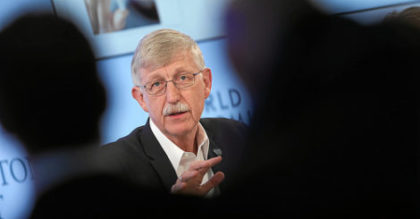Last week, the Templeton Foundation announced that Francis Collins was the 2020 winner of their annual prize recognizing contributions to the dialogue between science and the deep questions our world and ourselves. Collins has made substantial contributions to biomedical science, helping to identify genes for conditions like cystic fibrosis and Huntington's disease before going on to lead the Human Genome Project. He is also a notable participant in the dialogue between science and Christian religion, most prominently … [Read more...] about Science Corner: Congratulations, Templeton Prize Winner Francis Collins
francis collins
Science Corner: 2019 BioLogos Conference Recap
Last week I had the opportunity to attend the BioLogos conference in Baltimore, MD. Although there is a healthy dose of science, their conferences have a different feel than American Scientific Affiliation meetings, or at least the one I attended. ASA is primarily focused on scientists and students in the sciences, while BioLogos positions itself to address a broader audience. As a result, their conference attracts pastors, middle and high school teachers and interested members of the public in addition to an assortment … [Read more...] about Science Corner: 2019 BioLogos Conference Recap
Does science rule out God?
This is the second in a series of blog posts concerned with Christian questions about evolution. A major question for me after I became a Christian was: Does science in general and evolution in particular rule out God? I know that is also a question that troubles many Christians. You may remember that in my first post on the Mechanism of Creation, the View from Science, I said that there were four meanings of evolution. The first three change over time, common descent, evolution by natural selection are conclusions … [Read more...] about Does science rule out God?
Book Review: The Language of God
The value of The Language of God: A Scientist Presents Evidence for Belief is that it was written by the Director of the Human Genome Project. Francis Collins'[1] personal narrative of coming to faith and his sometimes eloquent plea for an end to the warfare between science and faith are the most valuable parts of the book. These are the strengths of The Language of God and worth the price of admission if you have not heard his story. Likewise, Collins gives a good, if relatively brief, narrative of his work in … [Read more...] about Book Review: The Language of God
Are “agnostic” scientists really agnostic?
Last week, I became engaged in a rather lengthy online conversation about the religious faith of university scientists. It was prompted by this GetReligion post about Francis Collins. In my comments, I cited Rice sociologist Elaine Howard Ecklund's recent book Science vs. Religion: What Scientists Really Think, as well as her online article "Religion and Spirituality among University Scientists" (PDF). Ecklund's research examines the religious beliefs and practices of university scientists, with some important findings … [Read more...] about Are “agnostic” scientists really agnostic?


